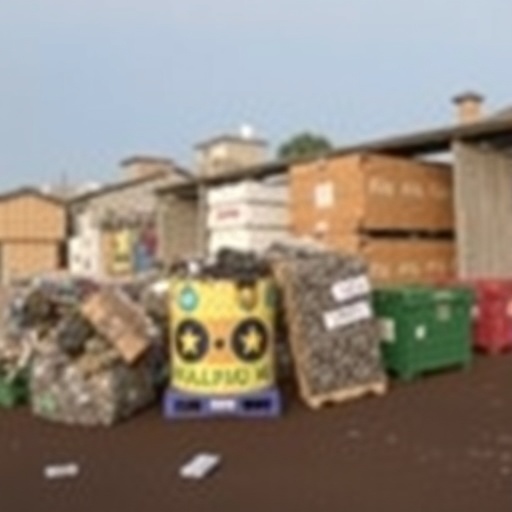Urban Ethiopia is facing pressing challenges regarding household waste management, a critical issue that has far-reaching implications for public health, environmental sustainability, and urban development. A recent systematic review and meta-analysis conducted by Temesgen et al. highlights the gaps in current waste management practices across urban regions in Ethiopia, underscoring the urgent need for effective strategies to mitigate these issues. This research not only sheds light on the existing deficiencies but also emphasizes the importance of community engagement and governmental support to enhance waste management systems.
The study’s authors meticulously examined various studies focused on household waste management practices in urban Ethiopian settings. They aimed to identify prevalent challenges and evaluate how these challenges could be addressed through innovative policies and public initiatives. This comprehensive review revealed a stark reality: many urban areas are struggling due to insufficient infrastructure, lack of public awareness, and ineffective implementation of waste management policies.
One of the major findings of the research was the inconsistency in waste collection services across urban centers in Ethiopia. Many households lack regular waste collection, which leads to the accumulation of waste in public spaces, resulting in unsightly and unsanitary conditions. The authors noted that in some regions, households are required to dispose of waste informally, often dumping it on streets or in vacant lots. This practice not only poses health risks due to the potential spread of disease but also hinders efforts to promote environmental sustainability.
Moreover, the study revealed that there is a significant gap in public awareness regarding proper waste disposal methods. Many residents are not adequately informed about the importance of sorting waste, recycling, or composting organic materials. This lack of awareness contributes to the volume of mixed waste that ends up in landfills, further exacerbating the waste management crisis. The authors argue that targeted educational campaigns could play a transformative role in reshaping residents’ behaviors regarding waste disposal.
In their analysis, Temesgen et al. also highlighted the need for communities to be actively involved in waste management initiatives. Engaging citizens not only facilitates better practices but also fosters a sense of ownership and responsibility towards the environment. Community-based approaches, such as establishing local waste management committees or organizing clean-up drives, have shown promise in other parts of the world and could be effectively adapted to the Ethiopian context.
The authors pointed out that governmental policies often fall short in supporting robust waste management. Inadequate funding for sanitation services and a lack of clear regulations for waste disposal have led to a fragmented approach to waste management in many urban areas. Political will is essential to create a cohesive strategy that addresses these gaps and empowers municipal authorities to implement change effectively.
Furthermore, the research underscores the impact of socio-economic factors on waste management practices. Low-income households may lack the resources to pay for proper waste disposal services, leading them to resort to informal methods. The authors recommend that policy-makers consider economic incentives or subsidies designed to make sustainable waste management practices more accessible to all socioeconomic groups.
As Ethiopia continues to urbanize at an unprecedented rate, the demand for efficient waste management solutions will only increase. The systematic review highlights the need for a multi-faceted approach that incorporates technological innovations, community engagement, and adequate policy frameworks. Investments in modern waste management technologies, such as waste-to-energy plants or improved recycling facilities, could significantly enhance the country’s waste management capabilities.
The findings from this study will serve as a foundational reference for stakeholders involved in waste management in Ethiopia, including government entities, NGOs, and community organizations. By systematically addressing the gaps identified in this review, there is potential for the TSEDU Ethiopia initiative to catalyze meaningful change, paving the way for a cleaner, healthier urban environment.
Importantly, a critical aspect discussed in the study is the integration of environmental education into school curricula. Educating the younger generation about responsible waste management and the value of environmental stewardship will cultivate a more environmentally conscious citizenry in the future. This proactive approach ensures that waste management becomes a fundamental part of civic responsibility from a young age.
The authors conclude that addressing the gaps in household waste management practices requires a collaborative effort among all sectors of society. By fostering partnerships between government, community groups, and educational institutions, Ethiopia can build a sustainable framework for waste management that not only resolves current issues but also anticipates future challenges as urban populations continue to grow.
Ultimately, the systematic review led by Temesgen et al. adds crucial knowledge to the ongoing discourse surrounding waste management in urban Ethiopia. As the country grapples with various socio-environmental challenges, effective waste management must be prioritized to safeguard public health and enhance urban livability. Moving forward, this study serves as a clarion call for urgency and action, inspiring initiatives that will transform waste management practices across Ethiopia’s urban landscapes.
The research presents an opportunity to revisit and reimagine how urban areas in Ethiopia manage waste. As cities evolve and expand, learning from gaps in current practices and implementing robust strategies will be key to achieving sustainable urban development.
By addressing these issues, urban Ethiopia could set an example for other developing regions facing similar challenges, demonstrating that with determination and innovative approaches, even the most significant waste management issues can be effectively resolved.
Subject of Research: Gaps in household waste management practices in urban Ethiopia.
Article Title: Systematic review and meta analysis on gaps in household waste management practices in urban Ethiopia for supporting the TSEDU Ethiopia initiative.
Article References:
Temesgen, A., Anteneh, R.M., Yeshiwas, A.G. et al. Systematic review and meta analysis on gaps in household waste management practices in urban Ethiopia for supporting the TSEDU Ethiopia initiative. Discov Sustain 6, 1058 (2025). https://doi.org/10.1007/s43621-025-01927-x
Image Credits: AI Generated
DOI: 10.1007/s43621-025-01927-x
Keywords: Household waste management, Urban Ethiopia, Sustainability, Community engagement, Public health.




